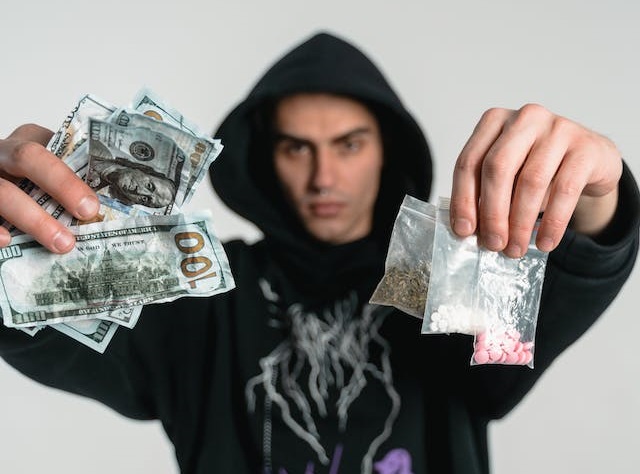
Table of Contents
Drug addiction refers to the chronic and relapsing condition resulting from continuous drug use or the intentional consumption of medicine in overdose. Addiction can lead to a lack of control and severe cravings affecting their professional and personal lives.
It is important to understand that problems related to drugs arise from the availability of a variety of chemicals, including hallucinogens. To reach the goal of a drug-free society it is important to understand and teach society to comprehend the difference between drug use, abuse, and dependence towards it.
This article explains about increased risk of drugs. How it affects your brain and behavior, the mental disorders, and physical changes in the body.
Drug Addiction
Addiction affects your brain’s chemical systems and circuits and forces the individual to take more of the drug as the brain gets influenced by the substance. Drug addiction is a chronic situation where the individual will not be able to resist, no matter how much harm a drug may cause. Therefore, it is necessary to seek help at the earliest to prevent severe consequences of getting addicted to drugs.
Drug abuse is not just from illegal substances like cocaine or heroin; it also includes substances such as alcohol, nicotine, anxiety medications, and much more. Initially, a person takes drugs due to the feeling of pleasure. Both illegal drugs and legal drugs will lead to substance use disorder, and over time, it changes the brain’s function, and this alteration can stay up for an extended period.
Understanding Drug Use and Addiction: History
Learning about history will help in understanding what influenced the use of a particular drug or substance. This will also help in understanding drug use and addiction. History helps to find the origin and how they deviated from their initial purpose, which further led to addiction and substance abuse. Understanding the foundation can help bring out the challenges associated with it.
Religious Practice
Drugs in early civilization were used for religious ceremonies and spiritual practices. Be it the opium in Egypt, peyote or ayahuasca in South American indigenous tribes, or the opium ceremony in Rajasthan. In this context, drugs were used for a religious context.
Drugs as Medicine
Opium was cultivated back in history to produce painkillers. This substance were used as medicine before it came to be known as drugs. The opium poppy was first cultivated for medicine and later developed into substances like morphine and then heroin.
Rise of Opiates: Becoming Addicted to Drugs or Medicine
In the 19th century, opium production rose for medicinal purposes. However, during this time, the rise of drug addiction to these substances has been observed. This led to the realization of the dangers of widespread drug use.
Misuse of drugs as a Weapon
The Opium War conflict happened between China and the British East India Company. British East India Company was heavily involved with the opium trade and was selling the drugs to China. The Chinese Government was alarmed by the social and health consequences of widespread opium use and attempted to suppress the trade.
Tension escalates between China and the British, along with a series of confrontations. The war began when Chinese authorities sieged and destroyed British-owned opium. This led the British to respond with military force.
India and Cannabis
Cannabis in India was widely used and legally accepted in India before 1985. India was one of the producers of cannabis for medical use. However, due to the rise of drug abuse, drug misuse, and international pressure to control drug usage, it was banned by the Indian Government under the Narcotic Drug and Psychotropic Substance Act.
Prohibition and Rise of Illicit Drugs
The ban on alcohol in the United States led to the rise of illicit substances and various synthetic drugs. In the late 19th and early 20th century, Coca-Cola, which had cocaine in its recipe, had to remove cocaine due to concerns regarding its addicting nature.
Rising Opioid Crisis
At present, there is a new crisis regarding drugs. Over-prescription of opioids and fentanyl has led to a rise in deaths due to drug overdose.

The Science of Addiction
Drug addiction is a complex situation with continuous effects on the physical, mental, and social well-being of an individual. The chemicals present in the drugs cause serious risk factors for the brain’s chemical system and circuits. The chemistry of the brain is impaired by these chemicals, affecting the reward system of the brain.
Dopamine is produced in the brain on the consumption of these drugs to try to feel a sense of euphoria and instigates the behavior of seeking more drugs. Over time, on repeated use of a drug, the brain will start adapting to the intake of these chemicals and will reach a state where more intake of the chemicals is required to cross the tolerance level. This lasts a long time and will make people addicted to drugs.
Problems due to drug addiction do not get restrained to personal issues but get extended to the economy also. An increase in healthcare expenses, low productivity, and absenteeism have serious impacts on the economy collectively. Research shows that people belonging to the younger age group are more likely to become addicted. Peer influence and brain changes during adolescence make young individuals more prone to experimentation and the display of risky behaviors, leading to the usage of drugs at an early age.
Cycle of Relapse
The cycle of relapse refers to the individual’s return to drug use after a period of struggle to restrain from it. Understanding this cycle and the various stages involved in it will help in developing strategies for intervention and preventing it.
1. The Initial Attempt to Drugs
In this stage, individuals arrive at an initial decision to take drugs without understanding how it affects their brain and behavior, mainly due to peer pressure, curiosity, or stress factors. Different people react to drugs differently. This will result in developing an addiction to a particular substance.
2. Drug Addiction/Drug Abuse
The pleasure sensations obtained from these drugs will create a tendency for repeated drug use to get the same feelings, and slowly, the person will become addicted to it.
3. Tolerance level
Continuous and regular use of the drugs will increase the tolerance level of the body, and start consuming larger doses of the drug to get high, underestimating the risks of it. As tolerance develops, the pattern of drug seeking and use increases the risk of addiction and eventually turns into a destructive cycle for the individual.
4. Negative Consequences of Drug Addiction
Over time, the negative consequences due to the usage of drugs become apparent. Broken relationships, Occupational problems and physical health issues will become apparent, and individuals will struggle to restrict their usage and take an exit from the loop.
5. Contemplation Phase and Associated Risk factors
This is the phase where the individual understands the requirement of change and shows a desire to exit from the usage of drugs. This will create an internal conflict between the individual desire to continue or quit the usage of drugs.
6. Restraining from Drug Overdose
Attempts to quit the usage begin at this phase, seeking help from individuals or taking professional help in addiction treatment. However, the emotional issues and carvings will make this phase difficult.
7. External Triggers
External triggers will affect the individual’s ability to restrict the usage of drugs. These external factors can be from peer pressure or social situations.
8. Relapse in Substance Use
The internal battle, external triggers and stressors will finally lead to relapse, which essentially means the return to the use of substances, breaking the self-made barrier. The individual now starts feeling guilt and shame on one’s inability to control his urge towards the drugs and will start feeling that it is not achievable.
Hence, the cycle repeats every time, even after years of not taking it.
Treatment Approach
People struggling with addictions should seek help from a health care provider or an addiction specialist. Treatment for drug addiction may include a medical process that helps manage withdrawal symptoms, counselling and support from family and friends. The Addiction health care providers can help patients through treatments like medication-assisted therapies and behavioral therapies for the patients to stop using drugs.
Individual interventions and prevention programs involving families are important. Involving families in the recovery process promotes the overall effectiveness of treatment, and it gives the best chance of success for individuals combating drug addiction.
Strategies for Drug Prevention
- Prevention programs involving families, schools, and communities can equip individuals with the knowledge and skills to make informed decisions regarding drug use. Early education can play an important role in ensuring that use and addiction are preventable to an extent.
- Early intervention programs can help recognize the signs of substance misuse and provide proper support can reduce from developing a full-blown substance use disorder.
- Creating supportive and drug-free environments is essential in lowering the overall risk of drug use and addiction.
FAQs
Some medicines have the potential to be addictive. Medications like opioid, fentanyl, anxiety pills have higher risk and potential addicting factors. These factors may lead to misuse drugs and cause addiction.
There are several factors that has led to the increase of addiction. This include family environment, peer influence, trauma and stress, easy accessibility are some of the factors.
The four elements of addiction that are part of drug problem. They are the four C's: Compulsion, loss of Control, Craving and Consequences.










